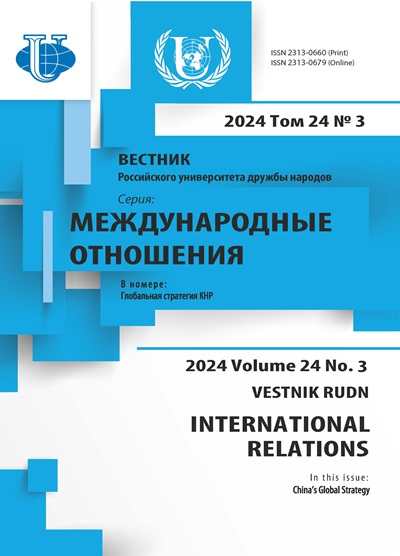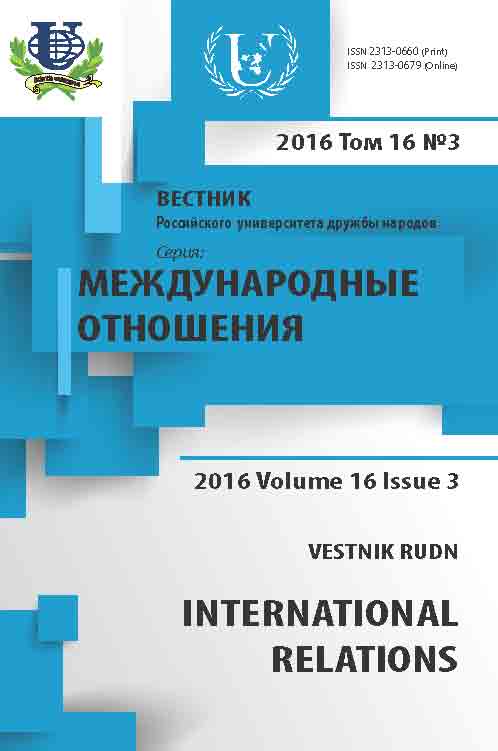Evolution of Relations Between Russia and Uzbekistan
- Authors: Bazileva S.P.1, Chernenko E.F.1
-
Affiliations:
- RUDN University
- Issue: Vol 16, No 3 (2016): International Conflicts: Quo Vadis?
- Pages: 505-520
- Section: Articles
- URL: https://journals.rudn.ru/international-relations/article/view/14768
Cite item
Full Text
Abstract
In the article the relations of Uzbekistan and Russia are examined in the context of making integration process more active in Eurasia based on the example of EAEU and SCO, proceeding in the period of increased turbulence of world system in 2014-2016, the aggravations of Russian relations with the West in connection with the introduction of anti-Russian sanctions and reorientation of Russian foreign economic policy to the East. The authors examine the development of Uzbek - Russian relations on the wide historical background in the light of interests of both countries, possibilities of increasing their competitive ability under the conditions of strengthening the crisis phenomena in the contemporary world as a whole, and on the Eurasian economic space, in particular. The association of the efforts of the two countries in the fight against international terrorism - one of the most serious calls of the present, participation in the solution of the vital problems of international safety on the continent within the framework of integrated associations could give additional political weight to both countries. The ability of Uzbekistan and Russia to search for and to find compromises in the process of regulating debatable questions of political and economic interactions is shown. In the article the attention is paid to the unrealized possibilities of the Uzbek - Russian relations, which are considered as the possible factor of the development of integration process in Eurasia. The authors consider the absence of any other alternative to further positive development of relations between Russia and Uzbekistan and to strengthening the many-sided contacts between them, which sources were placed in the distant past. The idea is defended about the fact that joining EAEU could bring essential political and economic dividends to Uzbekistan. Through the economic collaboration with Uzbekistan Russia can have the specific effect on its integrative policy.
Keywords
About the authors
Sabrina Pavlovna Bazileva
RUDN University
Author for correspondence.
Email: 1032146163@pfur.ru
Moscow, Russia
Elena Fedorovna Chernenko
RUDN University
Email: chikrizova_os@pfur.ru
Moscow, Russia
References
- Avilov, V.V., Galliamova, D.H. (2012). Rol' RF v obespechenii protsessa vstupleniya stran SNG v VTO [Russian's role in the process of accession of CIS countries to the WTO]. Vestnik Kazan. tekhnol. un-ta., 15(4).
- Buzan, B. (1991). People, States and Fear. An Agenda for International Security Studies in the Post-Cold War Era. Boulder: Lynne Rienner Publisher.
- Chernenko, E.F. (2013). Vostochnaya orientatsiya vneshnei politiki Rossii: interesy, trudnosti i perspektivy [Eastern orientation of foreign policy of Russia: interests, difficulties and prospects for development]. Ezhegodnik «Rossiya: tendentsii i perspektivy razvitiya». Moscow: The publishing house INION of Russian Academy of Sciences, 8(1), pp. 364-368.
- Chernenko, E.F. (2014). Evraziiskaya integratsiya: geoekonomicheskii kontekst [Euroasian integration: geoeconomic context]. Zhurnal «Bezopasnost' Evrazii», 2(48), pp. 349-354.
- Horak, C. Dinamika rossiisko-kyrgyzstanskikh otnoshenii: ot situatsii Tsentr-periferiya k odnostoronnei zavisimosti [Dynamics of Russian-Kyrgyz relations: the situation Center-periphery to the one-sided dependence]. URL: http://ores.su/ru/journals/tsentralnaya-aziya-i-kavkaz/2007-nomer-5-53/a191573 (accessed: 02.03.2016).
- Karimov, M.M. (2013). Pryamye inostrannye investitsii kak faktor povysheniya konkurentosposobnosti ekonomiki Uzbekistana [Foreign direct investment as a factor in increasing the competitiveness of the economy of Uzbekistan]. Sovremennaya ekonomika: problemy, tendentsii, perspektivy, 8.
- Kamalov, O. (2015). Perspektivy sovershenstvovaniya grazhdansko-pravovykh norm Respubliki Uzbekistan v sfere postavki tovarov [Prospects for civil law improvement in the Republic of Uzbekistan in the sphere of goods delivery]. Zhurnal zarubezhnogo zakonodatel´stva i sravnitel´nogo pravovedeniya, 1(6), pp. 20-24.
- Krol, H., George, A. (2009). Statement of Krol, Hon. George A, Deputy assistant secretary of State, Bureau of South and Central Asian Affairs, department of State, Washington, DC // Senate Hearing 111-433. Hearing before the subcommittee on near Eastern and South and Central Asia affairs of the Committee of Foreign Relations United States Senate one hundred eleventh congress first session. U.S. Government Printing Office. URL: http://www.gpo.gov/fdsys/pkg/CHRG-111shrg56492/html/CHRG- 111shrg56492.htm (accessed: 02.03.2016).
- Lumpe, L. (2010). A timeline of U.S. military aid cooperation with Uzbekistan. Occasional Paper Series, 2.
- Maikova, G. (2007). Perspektivy otnoshenii Rossii i Tsentral'noi Azii [Prospects of relations between Russia and Central Asia]. Geopolitika. Rossiya v Tsentral'noi Azii, 1.
- Morozov, Y.V. (2009). Perspektivy sotrudnichestva organizatsii i soyuzov v tselyakh obespecheniya stabil'nosti i bezopasnosti v Tsentral'no-aziatskom regione [Prospects of cooperation between organizations and unions in order to ensure stability and security in Central Asia]. Mirovaya politika: vzglyad iz budushchego. Moscow.
- Meshcheryakov, K.E. (2013). Rossiisko-uzbekskie otnosheniya v 2008-2012 godakh: tendentsii i problemy razvitiya [Russian-Uzbek relations in 2008-2012: trends and problems of development]. Nauchno-tekhnicheskie vedomosti SPbGPU. Gumanitarnye i obshchestvennye nauki, 1.
- Paramonov, V., Stolpovsky O. (2008). Rossiya i Tsentral'naya Aziya: dvustoronnee sotrudnichestvo v voennoi sfere [Russia and Central Asia: bilateral cooperation in the military sphere]. Tsentral'naya Evraziya, 15.
- Paramonov, V., Stolpovsky O., Rossiya i strany Tsentral'noi Azii: dvustoronnee sotrudnichestvo v sfere bezopasnosti [Russia and Central Asian countries: bilateral cooperation in the sphere of security]. URL: http://ores.su/ru/journals/tsentralnaya-aziya-i-kavkaz/2009-nomer-2-62/a191431 (accessed: 02.03.2016).
- Popov, V.V. (2014). Ekonomicheskoe chudo perekhodnogo perioda: kak Uzbekistanu udalos' to, chto ne udalos' ni odnoi postsovetskoi ekonomike [The economic miracle of the transition period: how could Uzbekistan that could not be any post-Soviet economy]. Zhurnal Novoi ekonomicheskoi assotsiatsii, 1(21).
- Sabirov, R.G. (2014). Evolyutsiya voennoi politiki Rossii v otnoshenii otdel'nykh stran SNG: Kazakhstan, Uzbekistan, Кyrgyzctan [Evolution of Russian military policy in respect of certain CIS countries: Kazakhstan, Uzbekistan, Kyrgyzctan]. Vestnik Kazanskogo tekhnologicheskogo universiteta, 1. URL: http://cyberleninka.ru/article/n/evolyutsiya-voennoy-politiki-rossii-v-otnoshenii-otdelnyh-stran-sng-kazahstan-uzbekistan-kyrgyzctan (accessed: 02.03.2016).
- Swanstrom, N. (2004). The prospects for multilateral conflict prevention and regional cooperation in Central Asia. Central Asian survey, pp. 41-54.
- Tolipov, F. (2011). K voprosu o "bol'shoi strategii" Uzbekistana [On the "grand strategy" of Uzbekistan]. Tsentral'naya Aziya i Kavkaz,, 3. URL: http://cyberleninka.ru/article/n/k-voprosu-o-bolshoy-strategii-uzbekistana (reference date: 02.03.2016).
- Tompson, W. (2002). Putin's challenge: The politics of structural reform in Russia. Europe – Asia, 6.
- Yuldashev, R. (2010). Investment factor of economic development in Uzbekistan. Perspectives of Innovations, Economics and Business, 5/ 2.











